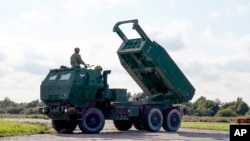The U.S. will send $1.7 billion in military aid to Ukraine, officials announced on Monday, including an array of munitions for air defense systems, artillery, mortars and anti-tank and anti-ship missiles.
The package includes $1.5 billion in funding for long-term contracts through the Ukraine Security Assistance Initiative, and $200 million in immediate military aid taken from Pentagon stockpiles.
The latest infusion of weapons comes a bit more than two weeks after the NATO summit in Washington, where allies focused a significant amount of time on shoring up support for Ukraine as it fends off Russian forces. President Joe Biden announced during the summit that the U.S. would send a Patriot missile battery to Ukraine, answering a key plea from Ukrainian President Volodymyr Zelenskyy.
NATO members agreed to create a new program to provide reliable military aid to Ukraine and prepare for its eventual membership in the alliance. And they declared Ukraine was on an “ irreversible ” path to join NATO.
In the latest package, air defense interceptors, rockets, artillery, and anti-tank weapons will be provided through presidential drawdown authority, which allows the Pentagon to pull the weapons directly from its shelves.
The air defense weapons include munitions for National Advanced Surface-to-Air Missile Systems, or NASAMS, and High Mobility Artillery Rocket Systems, or HIMARS.
The Pentagon said the longer-term contracted weapons will include “capabilities to augment” Ukraine’s air defenses, as well as other weapons.
The U.S. is also providing secure communications systems and funding for commercial satellite imagery services, as well as demolitions equipment.
In an unusual move, however, the Defense Department declined to make clear which specific systems were being sent to Ukraine quickly through the PDA and which would be funded through contracts and so wouldn't get to the warfront for months or years.
With the latest funding, the U.S. has now sent more than $55.4 billion in security assistance to Ukraine since Russia’s invasion in February 2022.
White House national security spokesman John Kirby said Monday that the package includes “key capabilities for the fight." He said this is the ninth military aid package for Ukraine since late April, when Congress finally passed supplemental funding for aid to Kyiv after months of gridlock and delays.
At that time, he said, “there were legitimate concerns that Russia would achieve a strategic breakthrough on the battlefield by the summer.” But since the funding passed Congress, “Ukraine’s defensive lines have been fortified and Ukrainian forces have continued to fight bravely and repel Russia’s advances.”
